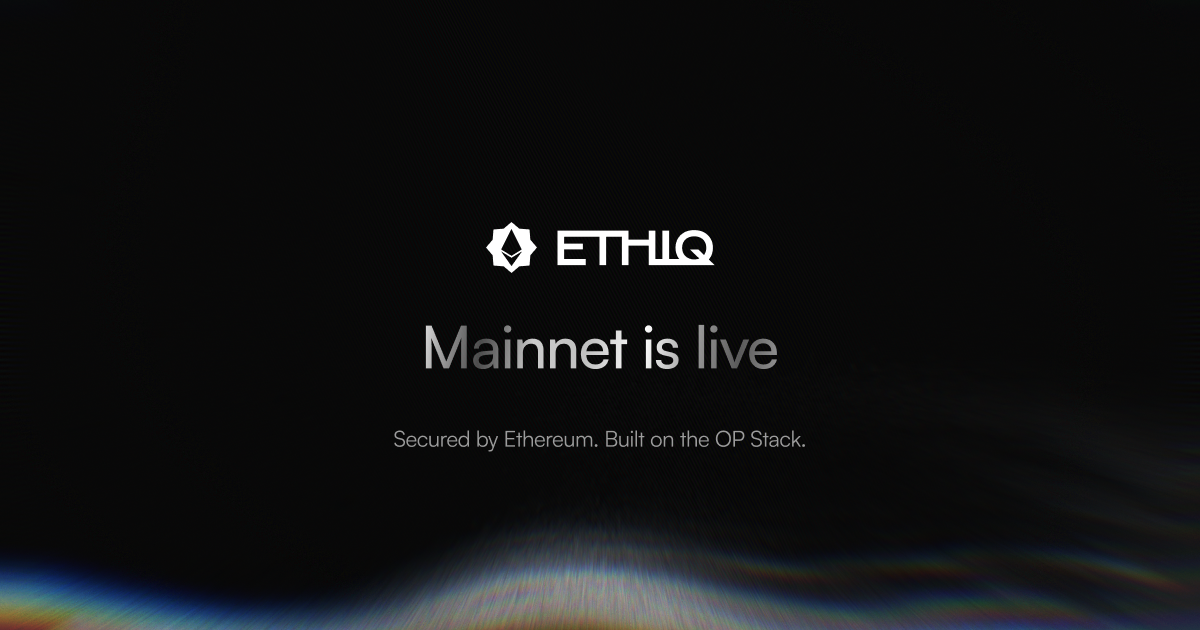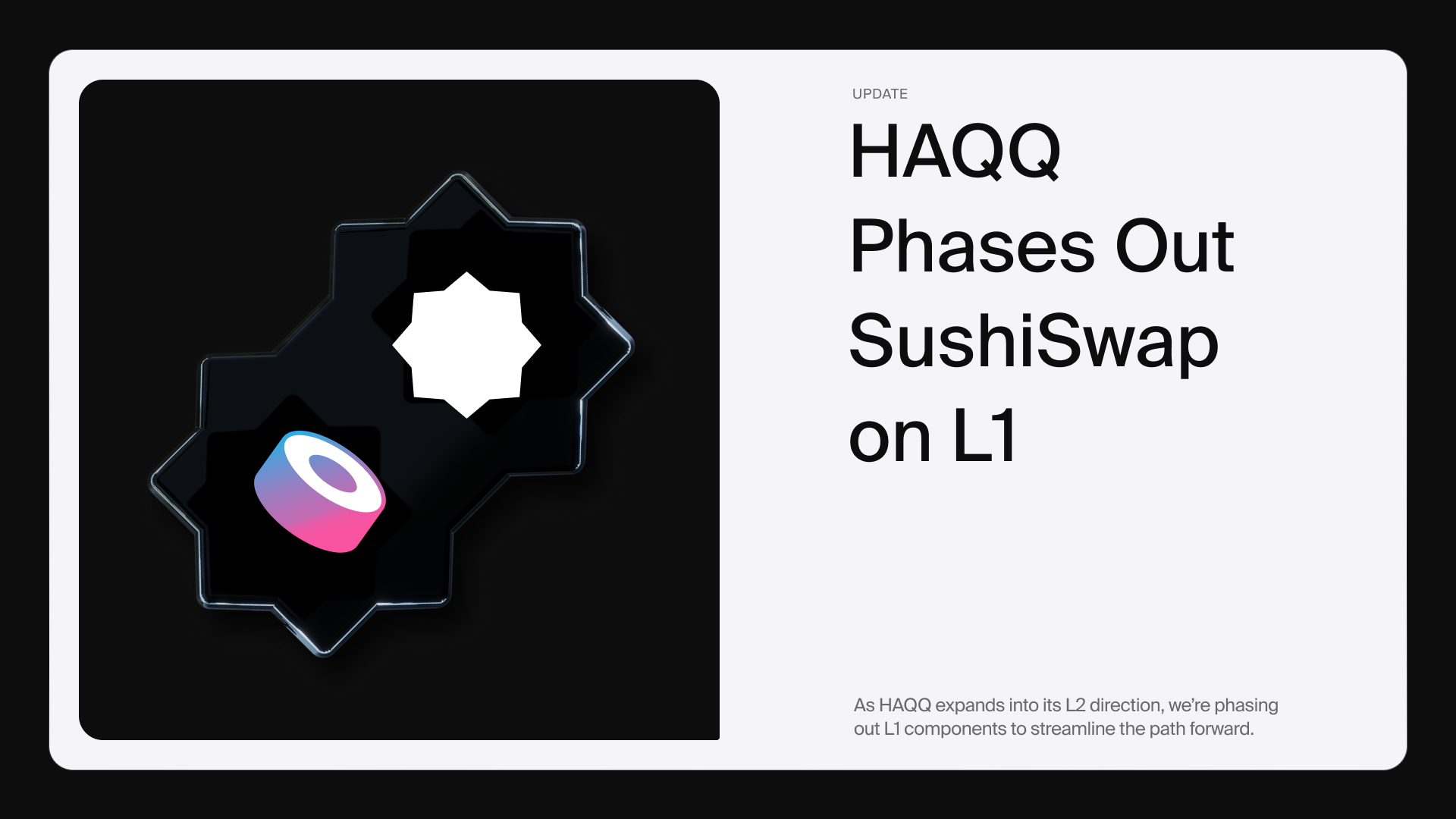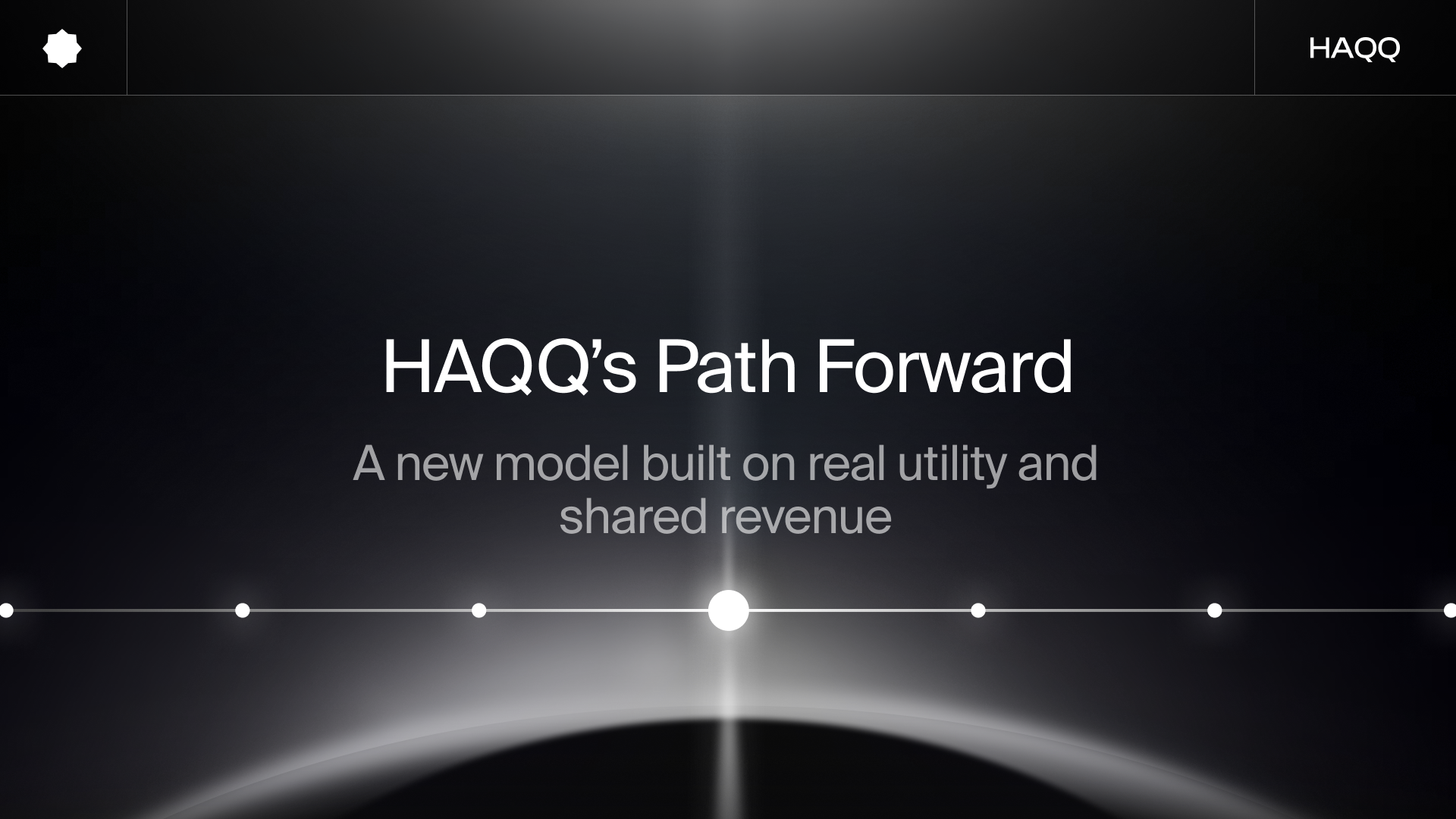
May 19, 2024 6:30 AM
HAQQ Insights: Understanding DeFi Sukuk
Imagine a financial instrument that doesn't just make you money but does so in a way that aligns with ethical principles carved in the sands of time. That's Sukuk. Sukuk are often referred to as Islamic bonds and stand tall on the pillars of Sharia, embracing fairness, transparency, and risk-sharing like old friends catching up over a cup of mint tea. No shady dealings, no hidden fees, just pure financial integrity.

Unlike conventional bonds, Sukuk represents ownership in tangible assets, projects, or services compliant with Islamic law. These assets are managed ethically, avoiding prohibited elements such as interest (riba), uncertainty (gharar), and speculation (maysir). However, while noble in intent, the traditional Sukuk market often falls short in terms of accessibility, liquidity, and efficiency. Investors are left parched for innovation in a landscape dominated by archaic systems and limited reach. And like a prayer answered, the invention of blockchain led to the emergence of a new financial system called decentralized finance, DeFi.
DeFi represents a paradigm shift in finance, leveraging blockchain technology to enable peer-to-peer transactions and automate complex financial processes without relying on traditional intermediaries like banks. The core tenets of DeFi include decentralization, transparency, and inclusivity, offering a level playing field for participants regardless of their geographical location or financial status. In DeFi, intermediaries like banks are as welcome as a camel in a coffee shop, replaced by blockchain-powered smart contracts that execute transactions with the precision of a master calligrapher. It's a world where transparency is the very foundation upon which fortunes are built. However, despite its revolutionary potential, DeFi is not without challenges, notably in regulatory compliance, security vulnerabilities, and ethical considerations.
So, what happens when you combine the ethical core of Sukuk with the innovative spirit of DeFi? You get DeFi Sukuk. Tokenizing Sukuk bridges the gap between the two worlds. By leveraging blockchain technology, Sukuk certificates are transformed into digital tokens, opening the doors to a new era of fractional ownership and global accessibility. This article explores the concept of DeFi Sukuk and the exciting possibilities that tokenized Sukuk in DeFi unlocks, exploring how it can reshape Islamic finance for the better.
##What is DeFi Sukuk? DeFi Sukuk takes its core principles and injects them with the capabilities of decentralized finance. At its core, DeFi Sukuk embodies the ethical and Sharia-compliant framework of Sukuk while harnessing the transparency, efficiency, and accessibility of DeFi protocols. This seemingly unlikely marriage creates a revolutionary financial instrument with immense potential, unlocking new avenues for investment, liquidity, and financial inclusion.
Issuing Sukuk on a DeFi platform
The basic issuance process of Sukuk on a DeFi platform follows a streamlined and transparent approach facilitated by smart contracts and blockchain technology. Here's a simplified overview of how Sukuk issuance unfolds in the DeFi realm:
- Asset Selection: The issuer identifies eligible assets or projects compliant with Islamic principles to serve as the underlying assets for the Sukuk issuance. These assets could range from real estate properties to infrastructure projects, ensuring tangible value backing the Sukuk.
- Structuring the Sukuk: Smart contracts are deployed to structure the Sukuk, defining the terms, conditions, and profit-sharing arrangements in accordance with Sharia principles. This includes specifying the Sukuk's maturity date, periodic profit distributions, and redemption mechanisms.
- Investor Onboarding: Investors participate in the Sukuk issuance by interacting with the DeFi platform. Through a user-friendly interface, investors undergo a streamlined onboarding process, which provides the necessary documentation and fulfils eligibility criteria.
- Token Distribution: Upon completion of the issuance process, the Sukuk assets are tokenized into digital tokens representing ownership rights. These tokens are distributed to investors based on their investment amounts and are recorded immutably on the blockchain.
- Profit Sharing: Throughout the Sukuk lifecycle, smart contracts govern profit distributions to investors in accordance with predefined terms. Profit generated from underlying assets is distributed to token holders based on their proportional ownership, ensuring transparency and fairness.
A New Dawn for Islamic Finance
DeFi Sukuk emerges not only as a financial instrument but as a catalyst for innovation within Islamic finance. By unlocking new possibilities for Shariah-compliant financial products, DeFi Sukuk can potentially transform the way Muslims participate in the global financial system.

To get a glimpse of what that exciting new financial landscape would look like, imagine a future where fractional ownership of income-generating properties becomes accessible to all. Tokenizing real estate assets, investors can acquire Sukuk tokens representing stakes in buildings, property portfolios, or specific projects. Through smart contracts, rental income seamlessly flows to token holders, ensuring adherence to Sharia principles of profit sharing.
But the canvas of DeFi Sukuk extends beyond real estate, and could be applied to financing critical infrastructure projects in a Sharia-compliant manner. Sukuk tokens could represent ownership in toll roads, renewable energy facilities, or transportation networks. Revenues generated from these projects are automatically distributed to Sukuk token holders, fostering transparency and ethical profit distribution.
Small and medium-sized enterprises (SMEs) stand as the backbone of many economies. DeFi Sukuk can empower these entities to raise capital for growth initiatives. By issuing Sharia-compliant Sukuk offerings on DeFi platforms, SMEs gain direct access to a global pool of potential investors. This democratized access sidesteps traditional financial intermediaries, could potentially secure more favorable financing terms and accelerate growth.
Beyond replicating traditional Sukuk structures, DeFi Sukuk also paves the way for entirely novel Sharia-compliant financial instruments. DeFi Sukuk can serve as the foundation for innovative Islamic fintech products. Imagine integrating Sharia-compliant financial services like Islamic insurance (Takaful) or microfinance with DeFi Sukuk platforms. This would create a comprehensive Islamic financial ecosystem that caters to a wide range of financial needs. Smart contracts allow for more flexibility in Sukuk structures compared to traditional methods. For example, Sukuk offerings could be programmed with pre-defined triggers for early redemption or profit distribution based on specific performance benchmarks, potentially offering investors greater control and transparency.
Impact on Islamic Finance Adoption
The transformative potential of DeFi Sukuk is multifaceted:
- Enhanced Accessibility: By removing geographical barriers and leveraging digital wallets, DeFi Sukuk makes Sharia-compliant investments more accessible to a global audience. This can broaden the investor base and contribute to the overall growth of Islamic finance.
- Increased Efficiency: Smart contracts automate manual processes, potentially reducing transaction costs and streamlining operations for both issuers and investors. This can make Sukuk offerings more efficient and cost-effective.
- Fractional Ownership: DeFi Sukuk facilitates fractional ownership of Sukuk tokens, making investments more accessible to smaller investors. This can encourage wider participation and democratize Islamic finance.
- Transparency and Security: Blockchain technology underpins DeFi Sukuk, ensuring a transparent and immutable record of transactions. This creates trust and security for all stakeholders involved in the ecosystem. DeFi Sukuk has the potential to drive greater adoption and inclusivity within the Islamic financial sector. With continued innovation and collaboration, DeFi Sukuk can pave the way for a more vibrant and dynamic future for Islamic finance.
A Boon for Ethical and Islamic Investors
Traditional Sukuk offerings have predominantly focused on real estate and infrastructure sectors, limiting investment options for Islamic investors. However, with DeFi Sukuk investors can gain access to a broader spectrum of assets, including technology startups, green energy initiatives, and digital infrastructure projects. This diverse asset class not only hedges investor portfolios but also provides avenues for ethical investment in emerging industries with substantial growth potential. The introduction of DeFi Sukuk injects dynamism into the Islamic finance sector, catalyzing its growth trajectory. According to industry reports, the total assets value of global Islamic finance markets amounted to 4.5 trillion U.S. dollars, and is set for significant expansion, with asset value projected to reach 6.67 trillion U.S. dollars by 2027. DeFi Sukuk will play a pivotal role in driving this growth, attracting a new wave of investors drawn to its transparency, efficiency, and ethical framework.

One of the key advantages of DeFi Sukuk is its ability to enhance market liquidity and accessibility for Islamic investors. Traditional Sukuk markets have often faced liquidity constraints, with limited secondary market trading and high transaction costs. However, DeFi Sukuk platforms facilitate seamless trading of Sukuk tokens on decentralized exchanges (DEXs), providing liquidity and price discovery mechanisms akin to traditional financial markets. This deepened liquidity reduces investment risk, and also allows for greater participation from institutional and retail investors, fueling the growth of Islamic finance.
HAQQ Network: Forging the Path in DeFi Sukuk
DeFi Sukuk's potential is undeniable, but its realization hinges on building a strong foundation. HAQQ is building out a purpose-built ecosystem designed specifically to facilitate the issuance, trading, and management of DeFi Sukuk offerings while adhering to Sharia principles. This commitment is evident in core features such as the Sharia Board made up of renowned Islamic scholars who guide developments on the network and ensure strict adherence to Sharia principles. Additionally, the Shariah Oracle provides a reliable and Sharia-compliant source of data for DeFi Sukuk smart contracts.
HAQQ Network leverages a secure and scalable blockchain infrastructure specifically designed for Shariah-compliant DeFi applications. The user-friendly HAQQ Wallet serves as a secure gateway for investors to navigate the world of DeFi Sukuk. It seamlessly integrates with the dApps, allowing users to invest in Sukuk offerings, manage their token holdings, and track profit distributions – all while maintaining full control over their digital assets.
By providing a secure, Sharia-compliant infrastructure and user-friendly tools, HAQQ empowers various stakeholders to contribute to the growth of DeFi Sukuk. For issuers, HAQQ offers a streamlined platform for them to launch Sukuk offerings, removing geographical limitations and connecting them with a global pool of potential investors. The HAQQ Wallet enables investors to participate in DeFi Sukuk offerings with ease, fostering wider participation and inclusivity within the Islamic finance sector. With robust developer tools and support, HAQQ allows for the creation of innovative Sharia-compliant DeFi applications, further facilitating the growth of the DeFi Sukuk sector. DeFi Sukuk holds immense promise for unlocking a new era of financial inclusion and prosperity for the global Muslim community. HAQQ has continued to be at the forefront of shaping the future of this space.
Build on HAQQ
Are you passionate about building ethical DeFi solutions? We're inviting builders to join the HAQQ ecosystem, with hands-on support and funding opportunities from our $40 million ecosystem fund. Connect with us and be a part of shaping the future of ethical finance.
Stay connected for more updates: Follow us on Twitter and Discord.
References:
Liquidity limitations with traditional Sukuk market
Liquidity constraints of traditional Sukuk
https://sec.gov.ng/investor-education/sukuk-islamic-bond-at-a-glance/
Unlocking new possibilities for Shariah-compliant financial products
Total value of Islamic finance assets worldwide from 2012 to 2022 with a projection for 2027

Ethiq Is Live: Ethereum L2 for Liquidity and Economic Alignment
Ethiq is now live on Ethereum. Built on the OP Stack, Ethiq serves as the liquidity and application hub for the Haqq ecosystem, with a unified value layer designed to reward participation.
January 9, 2026 12:00 PM













